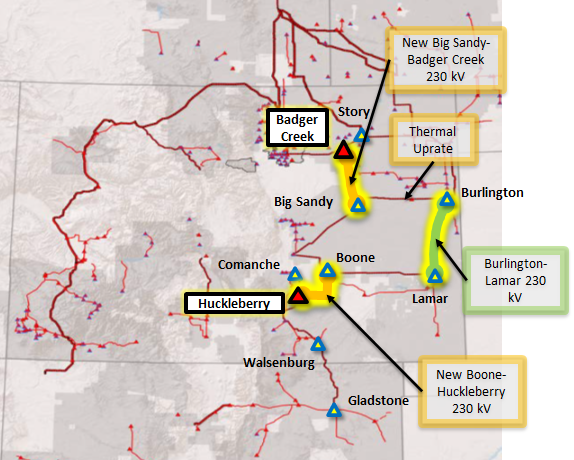Tri-State proposes transmission system additions and upgrades in eastern Colorado to support clean energy, reliability and system performance
- Tri-State identified need for eastern Colorado transmission upgrades to provide capacity for new, renewable generation resources that support its Responsible Energy Plan.
- Transmission system upgrades will help Tri-State achieve aggressive greenhouse gas reductions identified in Tri-State's 2020 Colorado Electric Resource Plan.
- Applications for “certificates of public convenience and necessity” made today with Colorado Public Utilities Commission.
- Proposal includes approximately 110 miles of new transmission, which coupled with other transmission upgrades, could increase the ability to add renewable energy into eastern Colorado by more than 700 megawatts.
(February 18, 2022 – Westminster, Colo.) – Wholesale power supply cooperative Tri-State Generation and Transmission Association announced today that it has filed with the Colorado Public Utilities Commission (CPUC) for approval of two new transmission lines in eastern Colorado.
Coupled with other minor upgrades and a previously approved third transmission line project, these lines will enable the Tri-State system to accommodate more than 700 megawatts of potential new generating capacity, improve reliability and close transmission system gaps in southeastern Colorado.
In filing for “certificates of public convenience and necessity” (CPCNs) with the CPUC for its eastern Colorado transmission upgrades, Tri-State noted that it is taking an incremental and pragmatic approach to additional transmission needs on its system. The capital investment in the four major segments to be constructed is estimated to be $185.6 million.
“By strategically and cost effectively interconnecting three new transmission lines into our existing network and improving an existing transmission line, we will ensure power reliability, eliminate bottlenecks in our system, and support significant clean energy additions as part of our transformative Responsible Energy Plan,” said Duane Highley, CEO for Tri-State. “Our electric resource plan before the CPUC identifies the need for an additional 2,000 megawatts of renewable resources across our interconnected system, and these transmission upgrades will help us achieve our aggressive greenhouse gas emission reductions goals.”
With the participation of more than 60 stakeholders representing 24 entities, Tri-State led a Task Force at the Colorado Coordinated Planning Group to evaluate alternatives to meet its transmission needs in eastern Colorado. Stakeholders proposed and Tri-State studied 15 alternatives through seven meetings between April and September of 2021. Of the alternatives studied, the proposed projects stood out as the best option that could meet Tri-State's needs, while at the same time being the lowest cost.
In its filing, Tri-State requests CPUC approval for two projects. The first is a new, 30-mile, 230-kilovolt transmission line from its Boone Substation near Boone, Colo., to a new Huckleberry switching station south of Pueblo, Colo. The second is a new, 80-mile, 230-kilovolt transmission line between its Big Sandy Substation near Limon, Colo., and a new Badger Creek switching station south of Fort Morgan, Colo.
Tri-State also is constructing the previously approved, 230-kilovolt transmission line between its Burlington, Colo., and Lamar, Colo., substations, and will modify certain structures on its existing Big Sandy-Burlington 230-kilovolt transmission line, which does not require a CPCN. The enclosed map shows the approximate locations of the proposed new transmission lines and substations.
The filing for a CPCN with regulators requires Tri-State to demonstrate that the public interest supports the need for the projects. Details on specific routes for the projects are not required at this time and will be developed through the local government permitting processes. Tri-State will begin the siting process upon CPUC approval of the transmission line and substation proposals.
Project specifically supports unique needs of Tri-State's members
While Tri-State supports all statewide transmission infrastructure development in the state, it notes that its project is separate from Colorado’s Power Pathway (CPP), a $1.7 billion proposal by Xcel Energy to deliver generation to the Front Range of Colorado.
Tri-State's studies confirm that the CPP project and Tri-State's proposed transmission system improvements will not interfere with each other, and together will help achieve Colorado’s renewable energy and greenhouse gas emission reduction goals.
###
About Tri-State
Tri-State is a wholesale power supply cooperative, operating on a not-for-profit basis, with 45 members, including 42 utility electric distribution cooperative and public power district members in four states that together deliver reliable, affordable and responsible power to more than a million electricity consumers across nearly 200,000 square miles of the West. Visit www.tristate.coop.
Contact:
Lee Boughey, 303-254-3555, lboughey@tristategt.org
Mark Stutz, 303-254-3183, mstutz@tristategt.org

Certain information contained in this press statement are forward-looking statements including statements concerning Tri-State’s plans, future events, and other information that is not historical information. These forward-looking statements are subject to a number of risks, uncertainties and assumptions, including those described from time to time in Tri-State’s filings with the Securities and Exchange Commission. Tri-State’s expectations and beliefs are expressed in good faith, and Tri-State believes there is a reasonable basis for them. However, Tri-State cannot assure you that management’s expectations and beliefs will be achieved. There are a number of risks, uncertainties and other important factors that could cause actual results to differ materially from the forward-looking statements contained herein.
